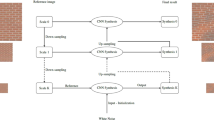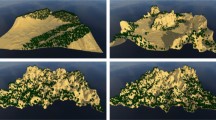Abstract
This paper presents the first method for synthesizing seasonal transition of terrain textures for an input heightfield. Our method reproduces a seamless transition of terrain textures according to the seasons by learning measured data on the earth using a convolutional neural network. We attribute the main seasonal texture transition to vegetation and snow, and control the texture synthesis not only with the input heightfield but also with the annual temperature and precipitation based on Köppen’s climate classification as well as insolation at the location. We found that month-by-month synthesis yields incoherent transitions, while a naïve conditioning with explicit temporal information (e.g., month) degrades generalizability due to the north–south hemisphere difference. To address these issues, we introduce a simple solution—periodic conditioning on the annual data without explicit temporal information. Our experiments reveal that our method can synthesize plausible seasonal transitions of terrain textures. We also demonstrate large-scale texture synthesis by tiling the texture output.








Similar content being viewed by others
Explore related subjects
Discover the latest articles, news and stories from top researchers in related subjects.Data availability
Data are provided within the manuscript. The source codes and pre-trained models will be released upon acceptance.
Notes
We used pvlib for calculating the solar altitude from the latitude.
References
Agency, E.S.: Sentinel-2 MSI level-2a BOA reflectance (2023). https://sentinels.copernicus.eu/web/sentinel/technical-guides/sentinel-2-msi/level-2a-algorithms-products. Accessed 22 Dec 2023
Argudo, O., Andujar, C., Chica, A., Guérin, E., Digne, J., Peytavie, A., Galin, E.: Coherent multi-layer landscape synthesis. Vis. Comput. 33(6–8), 1005–1015 (2017)
Argudo, O., Galin, E., Peytavie, A., Paris, A., Guérin, E.: Simulation, modeling and authoring of glaciers. ACM Trans. Graph. 39(6), 1–14 (2020)
Benes, B., Andrysco, N., Stava, O.: Interactive modeling of virtual ecosystems. In: Eurographics Workshop on Natural Phenomena, pp. 9–16. The Eurographics Association (2009)
Beneš, B., Millán, E.U.: Virtual climbing plants competing for space. In: Proceedings of the Computer Animation, CA ’02, pp. 33–42. IEEE Computer Society, USA (2002)
Braaten, J.: Sentinel-2 cloud masking with s2cloudless. https://developers.google.com/earth-engine/tutorials/community/sentinel-2-s2cloudless (2020). Accessed 18 Oct 2023
Brown, S.A., Samavati, F.: Real-time panorama maps. In: Non-Photorealistic Animation and Rendering. Association for Computing Machinery, Inc (ACM) (2017)
Chen, D., Chen, H.W.: Using the Köppen classification to quantify climate variation and change: an example for 1901–2010. Environ Dev 6, 69–79 (2013)
Copernicus Climate Change Service: Era5-land monthly averaged data from 2001 to present (2019). https://cds.climate.copernicus.eu/doi/10.24381/cds.68d2bb30. Accessed 22 Dec 2023
Cordonnier, G., Ecormier, P., Galin, E., Gain, J., Benes, B., Cani, M.: Interactive generation of time-evolving, snow-covered landscapes with avalanches. Comput. Graph. Forum 37(2), 497–509 (2018)
Cordonnier, G., Jouvet, G., Peytavie, A., Braun, J., Cani, M.P., Benes, B., Galin, E., Guérin, E., Gain, J.: Forming terrains by glacial erosion. ACM Trans. Graph. 42(4), 1–14 (2023)
Dachsbacher, C., Bolch, T., Stamminger, M.: Procedural reproduction of terrain textures with geographic data. In: Proceedings of Vision Modeling and Visualization, pp. 105–112 (2006)
Foldes, D., Benes, B.: Occlusion-based snow accumulation simulation. In: Proceedings of the fourth workshop on virtual reality interactions and physical simulations, VRIPHYS 2007, pp. 35–41. Eurographics Association (2007)
Galin, E., Guérin, E., Peytavie, A., Cordonnier, G., Cani, M.P., Benes, B., Gain, J.: A review of digital terrain modeling. Comput. Graph. Forum 38(2), 553–577 (2019)
Goodfellow, I., Pouget-Abadie, J., Mirza, M., Xu, B., Warde-Farley, D., Ozair, S., Courville, A., Bengio, Y.: Generative adversarial nets. In: Advances in Neural Information Processing Systems, vol. 27, pp. 2672–2680. Curran Associates, Inc. (2014)
Gorelick, N., Hancher, M., Dixon, M., Ilyushchenko, S., Thau, D., Moore, R.: Google earth engine: planetary-scale geospatial analysis for everyone. Remote Sens. Environ. 202, 18–27 (2017)
Greene, N.: Voxel space automata: Modeling with stochastic growth processes in voxel space. In: Proceedings of the 16th Annual Conference on Computer Graphics and Interactive Techniques, SIGGRAPH ’vol. 89, pp. 175–184. Association for Computing Machinery, New York, NY, USA (1989)
Grenier, C., Guérin, E., Galin, E., Sauvage, B.: Real-time terrain enhancement with controlled procedural patterns. In: Computer Graphics Forum p. e14992 (2023)
Guérin, É., Digne, J., Galin, E., Peytavie, A., Wolf, C., Benes, B., Martinez, B.: Interactive example-based terrain authoring with conditional generative adversarial networks. ACM Trans. Graph. 36(6), 228:1-228:13 (2017)
Guérin, É., Peytavie, A., Masnou, S., Digne, J., Sauvage, B., Gain, J., Galin, E.: Gradient terrain authoring. Comput. Graph. Forum 41(2), 85–95 (2022)
Ho, J., Jain, A., Abbeel, P.: Denoising diffusion probabilistic models. Adv. Neural Inf. Process. Syst. 33, 6840–6851 (2020)
Hadrich, T., Benes, B., Deussen, O., Pirk, S.: Interactive modeling and authoring of climbing plants. Comput. Graph. Forum 36(2), 49–61 (2017)
Isola, P., Zhu, J., Zhou, T., Efros, A.A.: Image-to-image translation with conditional adversarial networks. In: 2017 IEEE Conference on Computer Vision and Pattern Recognition, CVPR 2017, pp. 5967–5976. IEEE Computer Society (2017)
Lochner, J., Gain, J., Perche, S., Peytavie, A., Galin, E., Guérin, E.: Interactive authoring of terrain using diffusion models. Comput. Graph. Forum 42(7), e14941 (2023)
Makowski, M., Hädrich, T., Scheffczyk, J., Michels, D.L., Pirk, S., Palubicki, W.: Synthetic silviculture: multi-scale modeling of plant ecosystems. ACM Trans. Graph. 38(4), 131:1-131:14 (2019)
Mallya, A., Wang, T., Sapra, K., Liu, M.: World-consistent video-to-video synthesis. In: ECCV, Lecture Notes in Computer Science, vol. 12353, pp. 359–378. Springer (2020)
Měch, R., Prusinkiewicz, P.: Visual models of plants interacting with their environment. In: Proceedings of the 23rd Annual Conference on Computer Graphics and Interactive Techniques, SIGGRAPH ’96, pp. 397–410. Association for Computing Machinery, New York, NY, USA (1996)
NASA JPL: NASADEM Merged DEM Global 1 arc second V001 (2020). https://lpdaac.usgs.gov/products/nasadem_hgtv001. Accessed 18 Oct 2023
Palubicki, W., Makowski, M., Gajda, W., Hädrich, T., Michels, D.L., Pirk, S.: Ecoclimates: climate-response modeling of vegetation. ACM Trans. Graph. 41(4), 155:1-155:19 (2022)
Panagiotou, E., Charou, E.: Procedural 3d terrain generation using generative adversarial networks. In: Workshops of the 11th EETN Conference on Artificial Intelligence 2020 co-located with the 11th EETN Conference on Artificial Intelligence (SETN 2020), CEUR Workshop Proceedings, vol. 2844, pp. 9–14. CEUR-WS.org (2020)
Pang, Y., Lin, J., Qin, T., Chen, Z.: Image-to-image translation: methods and applications. IEEE Trans. Multim. 24, 3859–3881 (2022)
Park, T., Liu, M., Wang, T., Zhu, J.: Semantic image synthesis with spatially-adaptive normalization. In: CVPR 2019, pp. 2337–2346. Computer Vision Foundation/IEEE (2019)
Park, T., Zhu, J.Y., Wang, O., Lu, J., Shechtman, E., Efros, A., Zhang, R.: Swapping autoencoder for deep image manipulation. In: Advances in Neural Information Processing Systems, vol.33, pp. 7198–7211. Curran Associates, Inc. (2020)
Peel, M.C., Finlayson, B.L., McMahon, T.A.: Updated world map of the Köppen–Geiger climate classification. Hydrol. Earth Syst. Sci. 11(5), 1633–1644 (2007)
Perche, S., Peytavie, A., Benes, B., Galin, E., Guérin, E.: Authoring terrains with spatialised style. Comput. Graph. Forum 42(7), e14936 (2023)
Pirk, S., Niese, T., Hädrich, T., Benes, B., Deussen, O.: Windy trees: computing stress response for developmental tree models. ACM Trans. Graph. 33(6), 1–11 (2014)
Premoze, S.: Computer generation of panorama maps. In: 3rd ICA Mountain Cartography Workshop. Citeseer (2002)
Richter, S.R., Alhaija, H.A., Koltun, V.: Enhancing photorealism enhancement. IEEE Trans. Pattern Anal. Mach. Intell. 45(2), 1700–1715 (2023)
Ronneberger, O., Fischer, P., Brox, T.: U-Net: Convolutional networks for biomedical image segmentation. In: Medical Image Computing and Computer-Assisted Intervention—MICCAI 2015, Proceedings, Part III, Lecture Notes in Computer Science, vol.9351, pp. 234–241. Springer (2015)
Saharia, C., Chan, W., Chang, H., Lee, C., Ho, J., Salimans, T., Fleet, D., Norouzi, M.: Palette: Image-to-image diffusion models. In: ACM SIGGRAPH 2022 Conference Proceedings, SIGGRAPH ’22. Association for Computing Machinery, New York, NY, USA (2022)
Schott, H., Paris, A., Fournier, L., Guérin, E., Galin, E.: Large-scale terrain authoring through interactive erosion simulation. ACM Trans. Graph. 42(5), 1–15 (2023)
Spick, R.J., Walker, J.A.: Realistic and textured terrain generation using GANs. In: European Conference on Visual Media Production, vol. 3, pp. 1–10. ACM (2019)
Takahashi, H., Kanamori, Y., Endo, Y.: 3D terrain estimation from a single landscape image. Comput. Anim. Virtual Worlds 33(6), e2119 (2022)
Zhao, Y., Liu, H., Borovikov, I., Beirami, A., Sanjabi, M., Zaman, K.: Multi-theme generative adversarial terrain amplification. ACM Trans. Graph. 38(6), 1–14 (2019)
Zhu, J., Kelly, T.: Seamless satellite-image synthesis. Comput. Graph. Forum 40(7), 193–204 (2021)
Zhu, J., Park, T., Isola, P., Efros, A.A.: Unpaired image-to-image translation using cycle-consistent adversarial networks. In: IEEE International Conference on Computer Vision, ICCV 2017, pp. 2242–2251. IEEE Computer Society (2017)
Zhu, J., Zhang, R., Pathak, D., Darrell, T., Efros, A.A., Wang, O., Shechtman, E.: Toward multimodal image-to-image translation. In: Advances in Neural Information Processing Systems 30: Annual Conference on Neural Information Processing Systems 2017, pp. 465–476 (2017)
Ethics declarations
Conflict of interest
The authors declare no competing interests.
Additional information
Publisher's Note
Springer Nature remains neutral with regard to jurisdictional claims in published maps and institutional affiliations.
Appendix A: A large-scale texture synthesis by tiling outputs
Appendix A: A large-scale texture synthesis by tiling outputs
To obtain a large terrain texture corresponding to a heightfield larger than the input/output resolution (i.e., \(256 \times 256\)) of our texture generation CNN, we seamlessly connect adjacent output textures using alpha blending. We divide an input heightfield into small tiles of \(256 \times 256\) pixels with a stride of 128 pixels and feed them to the texture generation CNN to obtain small texture tiles corresponding to each heightfield tile. To blend the neighboring texture tiles, we blend the quarters (i.e., \(128 \times 128\) pixel regions) of each texture tile, which are covered by four neighboring tiles except for the heightfield boundaries. By applying an alpha map whose alpha values are defined by normalized distances from the center pixel, we can obtain a large terrain texture without noticeable seams. Figure 1 shows the rendered result with an alpha-blended texture corresponding to a heightfield of approximately \(5500 \times 5500\) pixels. For the temperature and precipitation in generating large-scale terrain textures, the user can choose whether to specify them on a per-tile basis or to use a constant value for the entire area, depending on the quality desired by the user. In the result of Fig. 1, the temperature is varied by \(-0.6\,{}^\circ \)C per 100 m elevation difference (standard temperature reduction rate) between the entire elevation average and the per-tile elevation average. While we used the same value for precipitation for simplicity, high-quality textures were obtained.
Rights and permissions
Springer Nature or its licensor (e.g. a society or other partner) holds exclusive rights to this article under a publishing agreement with the author(s) or other rightsholder(s); author self-archiving of the accepted manuscript version of this article is solely governed by the terms of such publishing agreement and applicable law.
About this article
Cite this article
Kanai, T., Endo, Y. & Kanamori, Y. Seasonal terrain texture synthesis via Köppen periodic conditioning. Vis Comput 40, 4857–4868 (2024). https://doi.org/10.1007/s00371-024-03485-1
Accepted:
Published:
Issue Date:
DOI: https://doi.org/10.1007/s00371-024-03485-1




